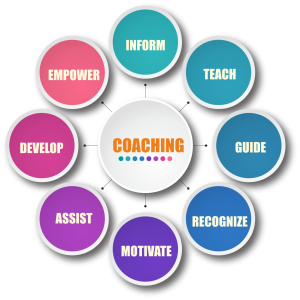Coaching is a transformative process, going beyond just assistance. It is the science and art of helping people realise their full potential so that they can do their best work. Coaching encourages development, understanding, and pursuit of objectives via thought-provoking dialogue, strategic questioning, and goal-setting.

Implementation is more important than information alone for achieving success. The goal of coaching is to help people make the transition from theoretical knowledge to practical skill use by closing the gap between the two. Whether in sales, leadership, or professional development, coaching is a game-changer that leads to confidence, consistency, and results.


People that want to lead, succeed, and remain ahead of the curve don’t have the luxury of choosing not to get coaching.
Are you prepared to take it to the next level? I would like to speak with you.
Collaboration with clients in an innovative and stimulating process that motivates them to reach their full professional and personal potential is how coaching is described by the International Coach Federation (ICF). The guiding principle of coaching is the client’s inherent creativity, resourcefulness, and wholeness, and the client’s status as the expert in his or her own life and career.
Standing on this foundation, the coach’s responsibility is to:
⦁ Discover, clarify, and align with what the client wants to achieve;
⦁ Encourage client self-discovery;
⦁ Elicit client-generated solutions and strategies; and
⦁ Hold the client responsible and accountable.
Coaches are trained to listen, to observe and to customize their approach to individual client needs. They seek to extract solutions and strategies from the client; they believe the client is naturally creative and resourceful. The coach’s job is to provide support to enhance the skills, resources, and creativity that the client already has.
To find out if coaching could help you, it’s a good idea to write down your goals for the session. A coaching partnership can help someone come up with a plan to more easily reach their goals when they have a good notion of what those goals are.
Since coaching is a goal based partnership, you should also examine whether you benefit from working with others, hearing different points of view, and being asked to think about things from different angles. You should also consider whether you have the resources to make significant adjustments in your career or personal life. Coaching could be a great way to help you grow and develop if you answered yes to these questions.
A professional coach can help you achieve your goals, develop as a person, and make positive changes in your life. Coaching distinguishes itself from other support professions by enabling individuals to take the lead in finding answers and advancing their own success.
– Coaching vs. Therapy: Therapy heals past wounds; coaching propels you toward future success through strategic action and accountability.
– Coaching vs. Consulting: Consultants provide expert solutions; coaches facilitate self-discovery and problem-solving.
– Coaching vs. Mentoring: Mentors share industry-specific experience; coaches help individuals find their own path.
– Coaching vs. Training: Training follows a structured curriculum; coaching adapts to personal goals with a flexible approach.
– Coaching vs. Athletic Coaching: Sports coaches correct behaviors; professional coaches build on strengths to foster development.
Coaching is about unlocking potential, driving growth, and achieving success—one step at a time!
Individuals or teams may seek coaching for various reasons, including:
⦁ Accelerating results and achieving goals faster.
⦁ Gaining clarity when faced with important decisions.
⦁ Managing success when it starts to create new challenges.
⦁ Restoring work-life balance to avoid negative consequences.
⦁ Identifying and leveraging core strengths effectively.
⦁ Tackling high-stakes challenges or exciting opportunities.
⦁ Bridging gaps in knowledge, skills, confidence, or resources.
Coaching is booming because the world is evolving fast. Traditional job structures are fading, and professionals need new strategies to thrive. Here’s why coaching matters now more than ever:
⦁ Navigating Change: Rapid business shifts, downsizing, and restructuring demand adaptability.
⦁ Bridging Skill Gaps: Managers face growing demands beyond their formal training.
⦁ Retaining Top Talent: Companies invest in employee growth to stay competitive.
⦁ Managing Workplace Pressures: Employees struggle with job insecurity and performance expectations.
⦁ Fostering Collaboration: Inclusive, people-centric workplaces drive business success.
⦁ Taking Control: More individuals seek personal and professional empowerment.
Coaching helps people focus on what truly matters in their career, growth, and fulfillment making it an essential tool in today’s ever-changing landscape.
Coaching begins with an initial conversation—either in person or virtually—to assess challenges, define goals, and establish clear outcomes. Sessions are then conducted regularly, with action steps assigned between meetings to drive progress. Coaches may also provide resources like articles, assessments, and frameworks to support development.
Key Elements of Coaching:
⦁ Assessments: Provide insights into strengths, challenges, and progress tracking.
⦁ Concepts & Models: Draw from various disciplines to foster self-awareness and fresh perspectives.
⦁ Appreciative Approach: Focuses on strengths, solutions, and proactive strategies to inspire action.
By combining structured guidance with a results-driven mindset, coaching empowers individuals to navigate challenges, unlock potential, and achieve meaningful growth.
The duration of a coaching partnership depends on individual or team needs. Some may achieve their goals within 3 to 6 months, while others benefit from a longer engagement. Factors influencing the timeframe include goal complexity, preferred working style, session frequency, and available resources.
Approach coaching as a collaborative partnership. Reflect on strong relationships in your life and consider what made them successful—apply those principles to your coaching experience. Here are some key tips:
⦁ Interview multiple coaches to find the right fit. Most offer free introductory sessions.
⦁ Assess stylistic similarities and differences to determine how they can support your growth.
⦁ Align your coaching goals with the coach’s expertise and working style.
⦁ Set clear expectations on handling challenges or concerns upfront.
⦁ Stay proactive, open communication is key to maximizing the coaching experience.
Coach’s Role: A coach provides objective insights to enhance self-awareness, actively listens to understand circumstances, and serves as a sounding board for strategic thinking. They champion potential, challenge perspectives, uncover blind spots, and support decision-making. Maintaining professional boundaries, confidentiality, and ethical standards is integral to their role.
Individual/Team’s Role: The individual or team sets the coaching agenda, leverages insights for growth, and takes full responsibility for decisions and actions. They embrace fresh perspectives, engage in problem-solving, and apply coaching tools to drive meaningful progress.
What does coaching ask of an individual?
Keys to Successful Coaching
Success in coaching begins with intention and requires:
⦁ Self-Focus – Engage with tough questions, face hard truths, and commit to personal growth.
⦁ Observation – Pay attention to behaviors and communication patterns.
⦁ Emotional Control – Stay composed in setbacks, avoiding reactive responses.
⦁ Courage – Push beyond fears, embrace abundance, and continuously challenge oneself.
⦁ Active Listening – Tune in to intuition, assumptions, and personal communication style.
⦁ Self-Discipline – Challenge limiting beliefs and adopt new, goal-oriented mindsets.
⦁ Personal Style – Maximize strengths while overcoming limitations.
⦁ Decisive Action – Take bold steps despite discomfort or self-doubt.
⦁ Compassion – Show patience with yourself and others through learning and setbacks.
⦁ Humor: Keep things light and use humor to navigate challenges.
Coaching success can be measured in two ways:
⦁ External Indicators – Tangible performance metrics visible in the individual’s or team’s environment, such as:
⦁ Internal Indicators – Personal growth metrics assessed by the individual or team, including:
Coaching requires a personal investment of time, energy, and finances. Fees vary based on the coach’s expertise and specialization. Before committing, individuals should evaluate the expected benefits and duration of coaching. Open communication about financial considerations is essential and should be discussed upfront before finalizing the agreement.